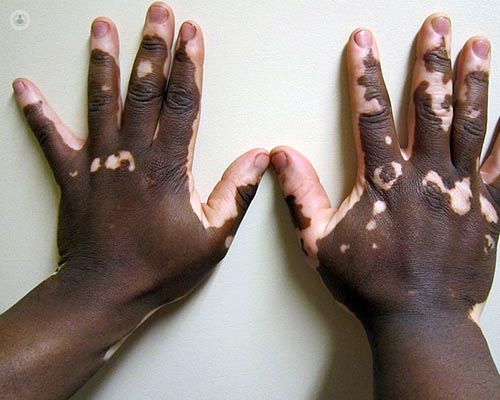What is vitiligo?
Escrito por:Have you ever seen someone in passing or in photos with unevenly colour skin? Some patches are one colour, whilst others are another? The chances are that they have what is called vitiligo; a skin condition that causes loss of skin colour in blotches over the body. Dr Dev Shah, a leading dermatologist, explains further and addresses the important psychological impact that this condition can have one sufferers.
What is vitiligo?
Vitiligo is a skin disease that results in loss of colour (melanin) in the skin in various parts of the body. This results in areas of the body that do not tan and remain white. Vitiligo can be localised (segmental) to one area, such as one leg, or it can be more widespread and affect most of the body (non-segmental).
What are the symptoms of vitiligo?
There are no symptoms of vitiligo, so if patients closed their eyes they would not know that they had vitiligo. However, vitiligo has a huge psychological impact and can lead to appearance-related concerns and significant mental health issues. Interestingly, many patients feel that their vitiligo began after a psychological event or trauma and now that they have vitiligo it perpetuates the psychological distress. The white patches can grow and after sometime may stabilise and stop growing.
What causes vitiligo?
Most theories are based around an abnormal immune reaction where our own body affects the melanocytes (cells that produce skin colour) within the skin, by attacking them (autoimmune destruction). There is not a proven definitive cause, however.
What should I do if I think I have vitiligo?
Vitiligo can often be disregarded by some doctors as only ‘cosmetic’. However, clinicians who treat patients with vitiligo know that for the patient this is a significant disease and has a huge impact on all aspects of life, including work, family and relationships. You should be listened to about your vitiligo by your doctor and, if necessary, be referred onto a consultant dermatologist who can advise you about the best way to treat you. It is really important to emphasise that vitiligo is easier to treat the earlier you start treatment.
Treatments will begin with ointments applied to the skin and can progress onto UV light treatment and sometimes oral tablets. Stable vitiligo that is not progressing can also be treated with skin transplantation.
It is also very important to address the psychological distress that patients experience at the same time as treating the skin.



